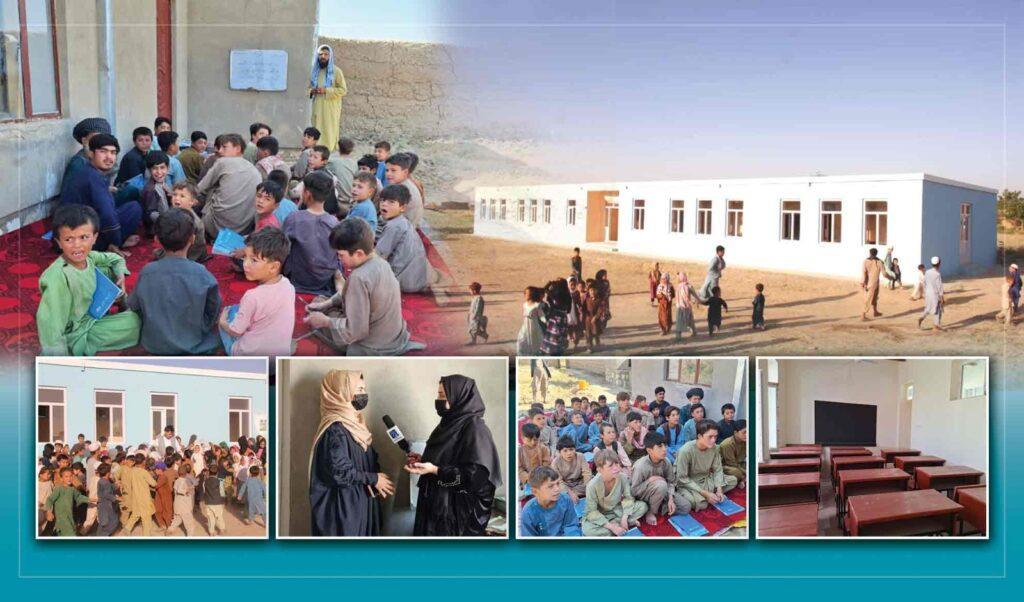
Insufficient Infrastructure: 122 Jawzjan Schools Still Without Buildings
SHIBERGHAN (Pajhwok): Thousands of students in northern Jawzjan province still study in rented houses, under tents or in open spaces, with experts warning that the lack of proper educational infrastructure is negatively affecting learning quality and students' health.
The provincial Education Department says efforts are underway to ensure a standard learning environment for all students.
Experts emphasise that an appropriate, well-equipped educational setting not only improves concentration and motivation but also protects students' physical well-being.
Students: Provide us with classrooms, desks, chairs
Due to the absence of school buildings, many schools in Jawzjan hold classes under tents, where students face difficulties throughout the year.
In one corner of Shiberghan city, the provincial capital, students sit on bare ground in a classroom without walls or a roof.
Farid, a nine-year-old student carefully writing down every word of his instructor, told Pajhwok that although studying outdoors was difficult, it did not stop them from learning.
He said:“Please build us classrooms, give us desks and chairs.”
Sahil, a 5th-grade student at Pirmazid Middle School in Shiberghan, pointed to an old worn-out tent and said:“We study under this old tent. In hot and cold weather, dusty winds and rain, we face many problems. But we never skip classes because we do not want to fall behind in our lessons.”
Hiding his trembling hands inside his sleeves, he added:“The weather is cold; we get sick very often.”
Sabir, another student, said he never gives up on studying, but if a proper school building is constructed, all students would attend lessons with greater enthusiasm.
Parents also call for the construction of school buildings
Qari Aziz, a resident of Shiberghan, said:“Due to the lack of buildings, our children face many difficulties in the hot summers and cold winters. They often fall sick.”
Abdul Ghafar, an elder in Shiberghan, said:“For years our children have been studying under tents or in open spaces. Previous governments paid no attention to building schools. Fortunately, in recent years some attention has been given and construction is ongoing. We hope more focus is placed on this area.”
Experts: Open-air, tent classrooms harm learning and student health
Education and health experts in Jawzjan warn that teaching outdoors, under tents, and in polluted environments lowers learning quality and poses risks to students' physical and mental health.
They urge the government and international organisations to establish standard educational facilities and equip schools with proper furniture and materials.
Sakhidad Qayoumi, an education expert in Jawzjan, said open-air teaching or studying under tents is one of the major challenges disrupting the learning process.
He said the more standard and well-equipped a learning environment is, the more motivated and engaged students become. Conversely, poor environments negatively affect learning and psychology.
He added that it is essential for the Islamic Emirate of Afghanistan (IEA) and international organisations to allocate resources for constructing standard classrooms and providing modern educational equipment.
Meanwhile, Lugman Baik, a doctor at Sehat Private Hospital in Shiberghan, said:“If we want to raise a knowledgeable, creative and confident generation, we must first ensure the quality of their educational environment - proper classrooms with desks and chairs, ventilation systems and a quiet atmosphere.”
He added:“If there is no classroom, if it is under a tent or outdoors, or if the learning environment is polluted - whether air pollution, noise pollution or unhygienic surroundings - it directly affects students' concentration, motivation and physical and mental health.”
He also urged the government and national and international organisations to invest seriously in constructing standard educational buildings equipped with necessary facilities.
150 school buildings built or repaired in past four years
Education Director Maulvi Lal Jan Rashid told Pajhwok that among the province's 365 active schools, 122 still lack buildings and operate in rented houses, under tents or in open spaces. These schools serve 25,754 students.
He did not specify how many of these schools operate in open spaces, how many in rented houses, and how many under tents.
He said that from 2022 until now, with support from partner organisations and education advocates, 150 schools have been newly built or repaired.
For example, he noted that repair work on 17 damaged school buildings has recently begun. Two days ago, the foundation stone of a new building for Chidara Middle School in Khanqah district was laid at a cost of 20 million afghanis.
He added that the budgets for repairing these schools were provided by the Ministry of Education, and the work is expected to be completed within two months by contracting companies, enabling more than one thousand additional students to access a safe learning environment.
kk/ma

Legal Disclaimer:
MENAFN provides the
information “as is” without warranty of any kind. We do not accept
any responsibility or liability for the accuracy, content, images,
videos, licenses, completeness, legality, or reliability of the information
contained in this article. If you have any complaints or copyright
issues related to this article, kindly contact the provider above.


















Comments
No comment